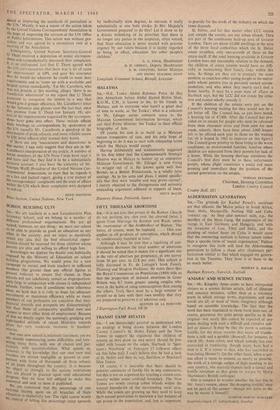SCQOt)L BUILDING CUTS
Sut.—We are teachers at a new Leicestershire Plan 'Grammar School, and we belong to a number of different professional organisations. We are all agreed, however, on one thing: we want our school to be able to provide as good an education as any other in the country; and we reject as manifestly unjust any idea that the best educational oppor- tunities should be reserved for those children whose Parents are able and willing to afford high fees.
Accordingly we deplore the drastic cuts habitually itnPosed by the Ministry of Education on school building programmes. We would press for a vast campaign to recruit and train teachers in sufficient numbers (far greater than any official figures at Present indicate) to ensure that classes in State schools will not indefinitely remain so disproportion- ately large in comparison with classes in independent schools. Further, even if conditions were otherwise ideal, we hold that it is folly to hope for adequate recruitment or maximum efficiency while so many members of our profession are conscious that their financial rewards and prospects are dishearteningly less than those of comparably qualified men and women in most other fields of employment Because of this we deeply regret the seemingly grudging and high-banded attitude of recent Ministers towards Plans for very moderate increases in teachers' salaries.
Our own new school is relatively fortunate, yet we are already experiencing some difficulties and fore- seeing many more, with size of classes and par- ticularly with accommodation. What appals us, however, is the knowledge that our own very real troubles are almost negligible at present in corn- Parison with those of thousands of State schools of all kinds throughout the country, It is because that object so strongly to the serious restrictions U14t are placed in practice upon vital educational PrOgress that we have felt obliged to make this statement and seek to have it published. We are convinced that the percentage of our L'all"nal income spent on all branches of State education is shamefully low. The right course would instead of letting this percentage creep upwards
by ineffectually slow degrees, to increase it really substantially at one bold stroke. Is Her Majesty's Government prepared to do this? Let it show us by a drastic rethinking of its priorities that there is no longer any justice in the suspicion, often voiced, that State education is never treated with genuine urgency by our rulers because it is tacitly regarded as being, in effect, education 'for other people's children.'
E. A. FINCH, Headmaster D. H. LINDLEY, Deputy Headmaster A. M. GRIFFITHS, Senior Mistress AND ENTIRE TEACHING STAFF Longslade Grammar School, Birstall, Leicester


































 Previous page
Previous page